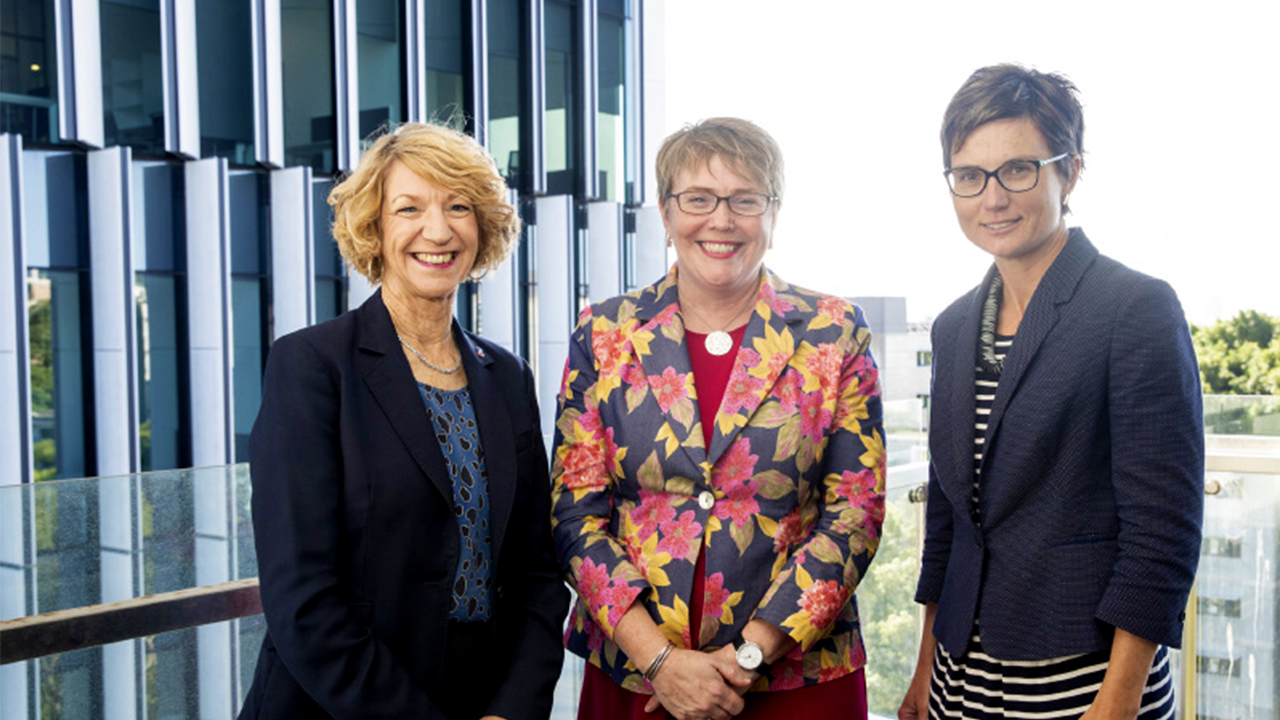
UNSW trialled the world’s first Vertical Job Share in 2019 - an innovative concept that is disrupting conventional university job-share arrangements. While traditional job share roles are usually between staff with similar levels of experience, this arrangement enabled employees one or two levels below to share management responsibilities with more senior staff members on a flexible basis.
Professor Rosalind Dixon developed this idea when she identified that career progression is often halted when people don’t have the capacity to work on a full-time basis. “The aim of this trial was to see how flexible working could be designed in the most senior roles, so people who can’t work long hours can also achieve their career goals,” Professor Dixon said.
Two Divisions participated in this trial – UNSW’s Division of Equity Diversity & Inclusion and Knowledge Exchange in the Division of Enterprise. Deputy Vice Chancellor EDI, Eileen Baldry, shared her position with Senior Deputy Dean of Business, Professor Leisa Sargent, while Director of KEDE, Warwick Dawson, trialled the vertical job-share approach with his colleague John Arneil.
“This program genuinely gives people in a more junior level, the chance to upskill and gain access to senior leadership experience,” Professor Baldry said.
Professor Sargent said the experience offered her unparalleled insight into how decision makers execute strategies. “I’ve learnt about the informal and formal power structures of the university and also a lot about how to pitch, listen and hopefully positively influence our culture at UNSW,” she said.
During her 2019 tenure, Professor Sargent was given significant responsibility. Professor Sargent led the analysis of UNSW’s first Respect! Survey (understanding staff and student experiences in relation to discrimination, bullying etc) results and oversaw the subsequent development of a three-year action-plan to address the concerns raised in the survey. As a result of increased exposure to the needs of students and staff across faculties, Professor Sargent has “thought deeply about the student experience and the need for a sophisticated data analytics approach to understanding our students.”
The Division also benefited greatly from Professor Sargent’s expertise. EDI noted a surge in productivity and innovation due to Leisa’s extensive pool of knowledge and experience. “It is very beneficial to have further diversity of perspectives in the EDI team. This helps us to be increasingly open to lateral ideas and ways of working,” Eileen said. With increased people power, Eileen was able to finish projects at a faster rate and undertake tasks she once had limited time for.
Meanwhile, in Knowledge Exchange, two men looked to challenge assumptions around flexible work. “The idea of two senior professional staff males trialling a flexible work arrangement was attractive as there is an unfortunate perception that flexible work arrangements are best suited to females,” Mr Dawson said.
Mr Dawson is frequently away from the office at meetings or conferences, so the appointment of a co-director provided staff with broader access to management – enhancing efficiency of team operations. Mr Dawson was often unable to attend important networking and educational events due to conflicting schedule clashes – something that happened less frequently under the vertical job share trial. “We ensure Knowledge Exchange is represented in UNSW senior forums as we regularly sub for each other,” Mr Arneil said.
While managers are responsible for key decisions, people in more junior positions may sometimes have more expertise and experience in certain areas. Mr Dawson said the VJS was an opportunity to leverage these talents and utilise them at an executive, decision-making level. “The VJS has provided a senior leadership opportunity for my co-Director in specific areas where he has extensive experience and skills, in fact at a higher level than me,” Mr Dawson said.
The duo have complementary strengths and weaknesses which meant they were able to focus their individual efforts on areas they can add the most value, while learning new techniques from each other.
“It allows us to direct our energies for maximum impact and also ensure the whole team has ready access to management,” Mr Arneil said.
The success of the 2019 trial paved the way for the VJS to be extended into 2020.
“Based on the benefits it offered both to participants and the University, the arrangements are continuing into 2020,” Dr Dixon said.
UNSW believes in the benefits of flexible work and has implemented flexible working arrangements for all staff. Learn more about flexible working at UNSW.
